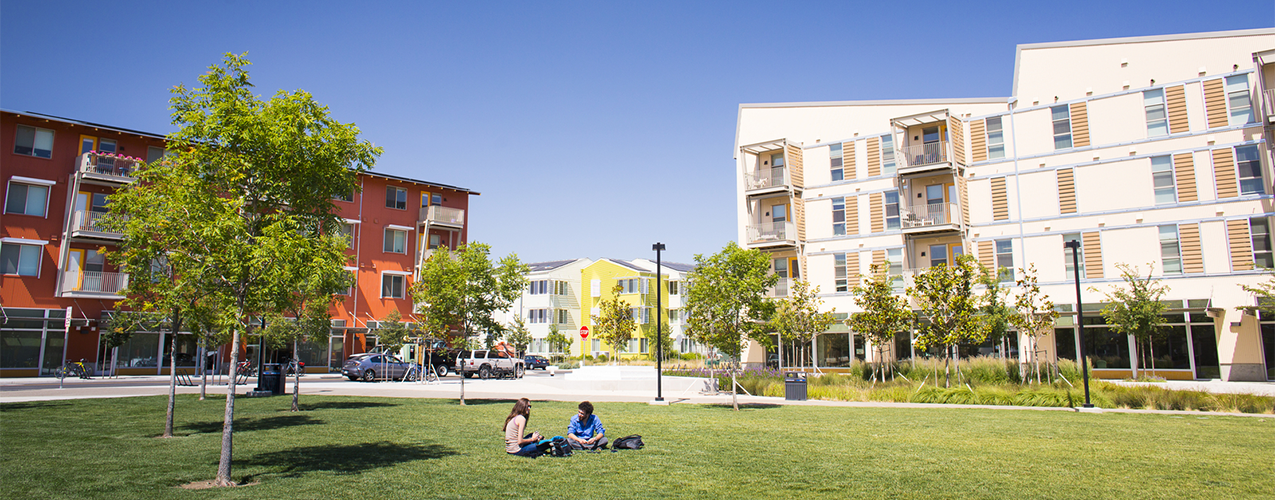History
Addressing student hunger was just the first step
The Basic Needs movement at the university has been pivotal in advancing student services, resources, research and best practices for historically underserved student populations.
UC's efforts to address basic needs insecurity began with the recognition that hunger and food insecurity was undermining students' ability to get an education. In 2009, UCLA started its Community Programs Office Food Closet in response to the Great Recession. Several years later, in 2014, the UC Global Food Initiative established food pantries on every UC campus, open to any UC student or employee.
Prior to attaining ongoing, sustainable funding, campuses varied greatly in the levels and duration of resources dedicated to campus-based basic needs programs. Consecutive years of one-time funding provided by the UC Office of the President (UCOP) and the state, combined with other resources generated at the campus level, allowed campuses to expand basic needs services, but reliance on one-time funding made it difficult for campuses to hire permanent staff or develop longer-term strategies because funding in future years was uncertain.
The 2019–20 State Budget Act put forth new ongoing State General Fund support, totaling $18.5 million, to address food and housing insecurity across the UC system. This included $15 million to support food and housing insecurity generally and another $3.5 million for rapid rehousing efforts to assist homeless and housing-insecure students.
These funds have allowed for the implementation and expansion of campus basic needs centers at every campus. To learn more about the impact of the funds, view previous legislative reports.
Timeline of Systemwide Basic Needs
2014
- Then-UC President Janet Napolitano and UC's 10 chancellors launched the UC Global Food Initiative (GFI) with the goal of providing nutritious food in a sustainable manner for a world population expected to reach 8 billion by 2025.
- This ambitious goal included a focus on addressing food security, and later basic needs security, among UC students.
- UC campuses then established working groups to coordinate food security efforts at the local level.
2015
- The UC Student Regent successfully advocated for the establishment of the Food Security and Access Committee as a part of the GFI.
- This committee conducted a GFI-funded Student Food Access and Security Survey (SFASS), which was then the nation's largest study of food security in higher education and marked the first time UC tracked food insecurity among students.
- Survey results revealed a growing need for funding campus programs to support student basic needs.
- President Napolitano approved a $75,000 allocation per undergraduate campus to immediately support student food access and to enhance existing campus food security projects.
- UCOP committed more than $3 million to UC campuses over a three-year period to comprehensively address basic needs challenges.
- That funding allowed campuses to move beyond emergency food support services to a holistic basic needs model.
2016
- UCOP granted the campuses $1.5 million for FY 2016–17.
- In January 2016, President Napolitano announced the UC Student Housing Initiative, which aimed to add 14,000 new affordable beds by 2020 and surpassed this goal by over 1,000 new beds.
- In support of that initiative, the UC Board of Regents approved a one-time allocation of $27 million in July 2017 to support campus efforts to address housing for students, faculty and staff.
- In May 2018, the Regents approved a second allocation of $30 million for the same purpose.
- CalFresh applications were coordinated at all campuses for the first time.
2017
- UCOP granted campuses $1.5 million for FY 2017–18 and the State Budget Act funds allocated $2.5 million to UC for basic needs efforts.
- The California State Legislature also provided $2.5 million in funding toward UC's Hunger Free Campus efforts during this year.
- These funds allowed UC campuses to:
- Expand emergency meal services
- Host CalFresh enrollment clinics
- Invest in one-time infrastructure and equipment needs
- Hire temporary staff to bolster overall basic needs efforts at the local level
2018
- Campuses received $1.5 million from State Budget Act funds, as well as another $1.5 million for Hunger Free Campus efforts.
- In November 2018, the Student Regent created the Regents' Special Committee on Basic Needs to assess how to improve the university's basic needs efforts and produce a report.
2019
- Campuses received $18.5 million from the Budget Act of 2019 for FY 2019–20, 2020–21 and 2021–22.
- This allocation included $15 million to address food and housing insecurity and $3.5 million to support rapid rehousing efforts.
2020
- UCOP granted campuses $4.6 million in over-enrollment funds reallocated for student basic needs, generated from Nonresident Supplemental Tuition (NRST) revenue.
- These funds are to be expended fully by 2024–25.
To view more information on the history of basic needs efforts and funding at UC, view the Regents' Special Committee on Basic Needs report.
When I transferred to Riverside this fall, I had a hard time adjusting both financially and academically. I faced food insecurity and rent insecurity. It was hard to concentrate on classes when I was worried about paying rent and where I could get meals. The basic needs resources on campus have been essential to minimizing my stress regarding essential needs like food and housing.

